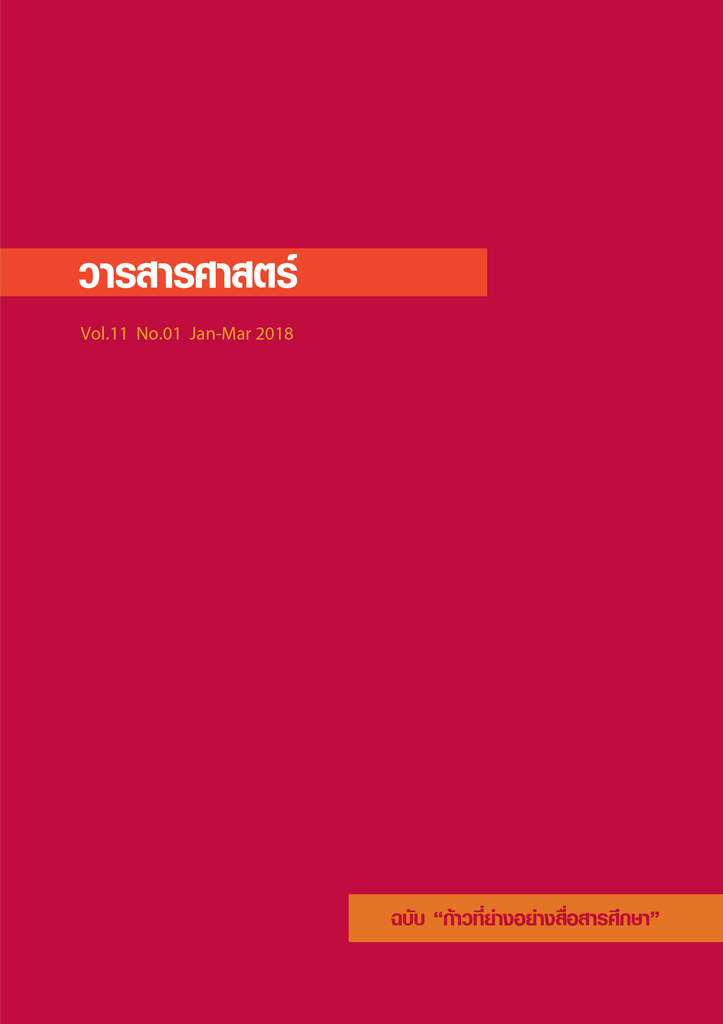บทความพิเศษ The Problematic of Communication as “Truth-Telling” in the Twenty-First Century?
คำสำคัญ:
-บทคัดย่อ
At the time of this writing, New York Times ran an article on Donald Trump Jr.’s email affirming the Russian government’s support for the Trump campaign with damaging information on Hilary Clinton, calling it: “Not Right Now: the Art of not Talking About Trump” (Flegenheimer and Huetteman, 2017). When asked about this issue, Republican senators, Toomey of Pennsylvania, Corker of Tennessee, and Hatch of Utah replied: “Not right now”; “Talk to others about politics”; and “He (Donald Trump Jr.) is a very nice young man, very dedicated to his father…(Though) he divorced their mothers,…(And that the controversy) “could be way overblown”, respectively.
Perhaps such reality, among others, is one of the reasons why in 2016, Oxford Dictionaries has declared the word “post-truth” to be its “international word of the year”. As a matter of fact, the use of the term had increased 2,000% in 2016 compared to 2015, influenced by the era of Donald Trump and Brexit, among other things. Oxford‘s “international word of the year” is
a way by which the passing year was reflected in language. The word “post-truth” is defined as an adjective “relating to or denoting circumstances in which objective facts are less influential in shaping public opinion than appeals to emotion and personal belief. Casper Grathwohl, Oxford Dictionaries President, predicted that he wouldn’t be surprised “if post-truth becomes one of the
defining words of our time”. He explained that Oxford’s choice “reflects a year dominated by highly charged political and social discourse. Fueled by the rise of social media as a news source and a growing distrust of facts offered up by the establishment, post-truth as a concept has been finding its linguistic footing for some time” (The Guardian, 15 November 2016).
It goes without saying that the word “post-truth” is not unproblematic. If one adopts Oxford’s definition of “post-truth” as the time when “objective facts” is less influential than human emotions and personal belief, and accepts that the era of post-truth, drawn from Latin- post means “after” or “behind”, then there are at least two problems with this definition. First, it equates “truth” with “objective facts” assuming also the existence of “objectivity” cherished by conventional epistemology. Second, it seems to suggest that human emotion or personal belief has nothing to do with “truth”, defined as “objective facts” or otherwise.
If both points are called into question, then it would mean that the present era is not “post-truth” since “truth” still functions in some ways, inherent in human emotions and beliefs among other things, in different spheres especially in the realm of communication. If twenty-first century communication is marked with advanced technology that enables human communication to be possible with unprecedented speed, then I would argue that there is a need to raise the question: what does speed do to communication as truth-telling project in the twenty-first century? This paper begins with a brief discussion of the notions of communication as “truth-telling” and “truth”. Then the problem of speed that characterized communication technology/reality in the twenty-first century will be explored. The paper ends with a critical appraisal of how such speed will render communication project as truthtelling increasingly problematic.
เอกสารอ้างอิง
Arendt, H. (1993), “Truth and Politics”, in Between Past and Future: Eight Exercises in Political Thought, New York: Penguin Books.
Bach, R. (1972), Jonathan Livingston Seagull, London: Harper Collins Publisher.
Blum, S. (2005), “Five Approaches to Explaining ‘Truth’ and ‘Deception’ in Human Communication”, Journal of Anthropological Research, 61 (3): 289-315.
Flegenheimer, M. and Huetteman, E. (2017), “‘Not Right Now’: Republicans and the Art of Not Talking About Trump”, New York Times, 11 July 2017.
Flynn, T. (1988), “Foucault as Parrhesiast: His Last Course at the College de France (1984)”, in Bernauer, J. and Rasmussen, D. (eds.), The Final Foucault, Cambridge: MIT Press.
Foucault, M. (1980), “Truth and Power”, in Colin Gordon (ed.), Power/Knowledge: Selected Interviews & Other Writings 1972-1977, translated by Gordon, C. et al., New York: Pantheon Books.
Gadamer, H. (1994), “What is Truth?”, in Wachterhauser, B. (ed.), Hermeneutics and Truth, Illinois: Northwestern University Press.
Galtung, J. (2013), A Theory of Peace: Building Direct Structural Cultural Peace, Transcend University Press.
Godin, S. (2012), All Marketers are Liars: The Underground Classic That Explains How Marketing Really Works--and Why Authenticity Is the Best Marketing of All, New York: Portfolio.
Marinetti, F. (2009), “The New Religion-Morality of Speed”, in Rainey, L. et al. (eds.), Futurism: An Anthology, New Haven: Yale University Press.
Misak, C. (2000), Truth, Politics, Morality: Pragmatism and Deliberation, London: Routledge.
Raza, S. (2012), “The North West Frontier of Pakistan: Preoccupation with ‘Unveiling’ the Battlefeld and the Continuing Violent Cartographies”, in Opondo, S. and Shapiro, M. (eds.), The New Violent Cartography: Geo-Analysis after the Aesthetic Turn, New York: Routledge.
Rorty, R. (1999), Philosophy and Social Hope, London: Penguin Books.
Shapiro, M. (1997), Violent Cartographies: Mapping Cultures of War, Minneapolis: University of Minneapolis Press.
Smeltzer, M. (1996), “Lying and Intersubjective Truth: A Communication Based Approach to Understanding Lying”, Argumentation, 10 (3): 361–373.
Satha-Anand, C. and Urbain, O. (2016), The Promise of Reconciliation?: Examining Violent and Nonviolent Effects on Asian Conflics, New Brunswick: Transaction.
The New Jerusalem Bible (1985), London: Darton, Longman & Todd.
Virilio, P. (2006), Speed and Politics, translated by Marc Polizzotti, Los Angeles: Semiotext(e).
Wood, J. (2015), Communication Mosaics: An Introduction to the feld of Communication, Boston: Cengage Learning.
Online
Ball, J. (2017), Post–Truth: How Bullshit Conquered the World, retrieved from https://www.amazon.com/Post-Truth-How-Bullshit-Conquered-World/dp/1785902148/ ref=sr_1_5?s=books&ie=UTF8&qid=1500180987&sr=1-5&keywords=media+and+ truth
Department of Defense (2007), Unmanned Systems Roadmap, 2007-2032: 47, retrieved from https://www.globalsecurity.org/intell/library/reports/2007/dod-unmanned-systems- roadmap_2007-2032.pdf
https://www.govtrack.us/congress/bills/114/hr1111/text/ih#link=I_102_g&nearest=HB480AF5F4CE9 41DFA1E91101BF5DB7F9
https://www.nj.com/politics/index.ssf/2017/01/merriam-webster_trolls_trump_adviser_on_ alternate_facts.html, retrieved 16 July 2017.
The Guardian, 15 November 2016, retrieved from https://www.theguardian.com/books/2016/nov/15/post-truth-named-word-of-the-year-by-oxford-dictionaries








